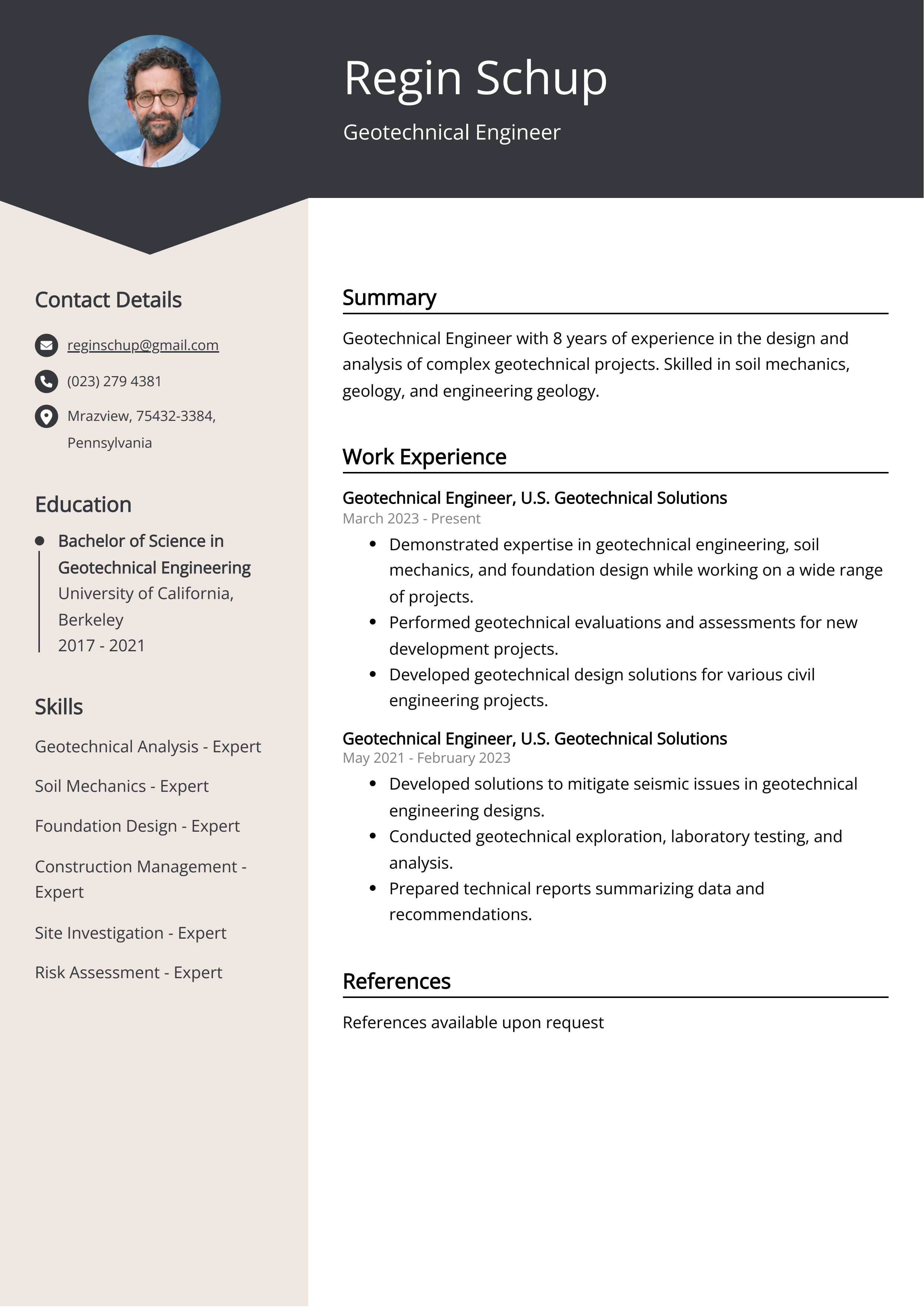The Single Strategy To Use For Geotheta
The Single Strategy To Use For Geotheta
Blog Article
The Definitive Guide for Geotheta
Table of ContentsThe Geotheta StatementsFacts About Geotheta RevealedThe Ultimate Guide To GeothetaThe Main Principles Of Geotheta Geotheta for Beginners

They perform site investigations, accumulate samples, carry out lab examinations, and examine information to assess the suitability of the ground for building jobs - Geo Tech Engineer. Based on their findings, geotechnical designers offer recommendations for structure layout, incline stability, keeping structures, and mitigation of geotechnical threats. They collaborate with various other professionals, such as engineers, structural designers, and building teams, to ensure that geotechnical factors to consider are incorporated right into the general project design and execution
By examining the habits and homes of dirt and rock, they can recognize prospective geotechnical risks such as landslides, soil settlement, or incline instability. Their knowledge assists protect against failures or crashes that can threaten lives and residential property. Right here are some in-depth responsibilities and obligations of a geotechnical designer: Website Investigation: Geotechnical engineers conduct website examinations to gather information on subsurface problems.
They translate the data to understand the properties and behavior of the soil and rock, including their strength, leaks in the structure, compaction characteristics, and groundwater conditions. Geotechnical Analysis and Design: Geotechnical designers evaluate the information collected during website examinations to examine the stability and suitability of the website for construction projects. They do geotechnical estimations and modeling to assess aspects such as bearing capability, settlement, slope security, lateral planet stress, and groundwater flow.
Getting The Geotheta To Work
Foundation Design: Geotechnical engineers play a critical function in developing foundations that can safely support the intended framework. They assess the soil conditions and lots requirements to establish the proper foundation type, such as shallow foundations (e.g., grounds), deep foundations (e.g (https://medium.com/@ianhammond2191/about)., heaps), or specialized methods like soil improvement. They take into consideration factors such as settlement limitations, bearing ability, and soil-structure communication to establish optimal structure designs
They evaluate construction strategies, display website activities, and carry out area examinations to verify that the layout suggestions are complied with. If unanticipated geotechnical problems emerge, they examine the scenario and offer suggestions for remediation or adjustments to the layout. Danger Assessment and Mitigation: Geotechnical designers evaluate geotechnical risks and dangers linked with the task website, such as landslides, liquefaction, or soil disintegration.

Collaboration and Communication: Geotechnical engineers function carefully with other experts associated with a task, such as architects, structural engineers, and construction teams. Reliable communication and collaboration are crucial to integrate geotechnical considerations into the total task design and construction procedure. Geotechnical engineers offer technological experience, answer questions, and make certain that geotechnical requirements are met.
Some Known Facts About Geotheta.
Below are some kinds of geotechnical engineers: Structure Engineer: Foundation engineers specialize in developing and analyzing foundations for structures. They assess the soil conditions, lots requirements, and site attributes to figure out the most appropriate foundation type and layout, such as superficial structures, deep foundations, or specialized strategies like stack structures.
They examine the elements affecting slope stability, such as soil homes, groundwater conditions, and slope geometry, and develop techniques to avoid slope failings and mitigate risks. Earthquake Designer: Quake designers focus on assessing and developing structures to withstand seismic forces. They analyze the seismic threat of a website, examine soil liquefaction possibility, and create seismic style requirements to make sure the safety and security and strength of frameworks during earthquakes.
They carry out field testing, accumulate examples, and assess the gathered data to characterize the dirt residential properties, geologic developments, and groundwater problems at a site. Geotechnical Instrumentation Engineer: Geotechnical instrumentation engineers focus on monitoring and measuring the read what he said actions of soil, rock, and structures. They mount and maintain instrumentation systems that keep track of elements such as soil negotiation, groundwater degrees, slope activities, and structural displacements to assess performance and give very early cautions of prospective issues.
Geotheta Fundamentals Explained
They conduct tests such as triaxial tests, loan consolidation examinations, straight shear examinations, and leaks in the structure tests to collect data for geotechnical evaluation and layout. Geosynthetics Designer: Geosynthetics engineers specialize in the style and application of geosynthetic materials, such as geotextiles, geogrids, and geomembranes. They use these products to boost soil stability, enhance inclines, supply water drainage options, and control erosion.
They often tend to be investigatory individuals, which means they're intellectual, reflective, and inquisitive. They are curious, methodical, reasonable, logical, and sensible. Several of them are additionally social, implying they're kind, generous, cooperative, client, caring, useful, compassionate, sensible, and friendly. Does this seem like you? Take our free profession test to discover out if geotechnical designer is among your leading job suits.
In the workplace setting, geotechnical engineers use specialized software tools to carry out estimations, develop designs, and evaluate information. They prepare reports, review task requirements, interact with clients and staff member, and coordinate project activities. The office setup offers a helpful atmosphere for research, evaluation, and cooperation with other professionals associated with the task.
Not known Facts About Geotheta
They frequently go to project websites to carry out website investigations, analyze geotechnical conditions, and gather data for evaluation. These brows through involve taking a trip to different places, often in remote or difficult terrains. Geotechnical engineers may perform soil sampling, conduct tests, and monitor building and construction tasks to guarantee that the geotechnical facets of the job are being carried out appropriately.
Geotechnical engineers likewise work in specialized geotechnical labs. Geotechnical laboratory designers function extensively in these settings, managing screening devices, operating tools, and videotaping data.
Report this page